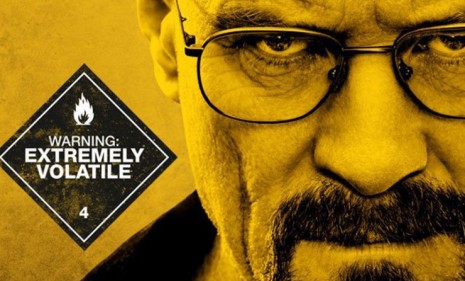Why Breaking Bad is the best drama on TV
AMC's award-winning show about a chemistry-teacher-turned-drug-kingpin returns Sunday night. Here are 5 persuasive reasons to tune in

A free daily email with the biggest news stories of the day – and the best features from TheWeek.com
You are now subscribed
Your newsletter sign-up was successful
AMC's beloved drama Breaking Bad returns for a fourth season Sunday night, after a 13-month hiatus. The intense series about a chemistry teacher who, after being diagnosed with cancer, begins producing and dealing meth to provide for his family has steadily grown in popularity and quality over its three seasons. Now that the fourth is here, critics are again heaping praise on the "still brilliant" show. Here, five reasons to watch:
1. The award-winning acting
Bryan Cranston won the Best Actor Emmy in each of the first three seasons of Breaking Bad. As teacher-turned-drug-pusher Walt, Cranston effortlessly flips from coldblooded ruthlessness to paternal concern. To say that Cranston is deft at tapping into emotional extremes "is putting it mildly," says Ellen Gray at The Philadelphia Inquirer. Add fellow Emmy-winner Aaron Paul's "searing" performance as Walt's young sidekick Jesse, says James Poniewozik at TIME, and Anna Gunn as Walt's conflicted wife, and you've got an impressive ensemble.
The Week
Escape your echo chamber. Get the facts behind the news, plus analysis from multiple perspectives.

Sign up for The Week's Free Newsletters
From our morning news briefing to a weekly Good News Newsletter, get the best of The Week delivered directly to your inbox.
From our morning news briefing to a weekly Good News Newsletter, get the best of The Week delivered directly to your inbox.
2. The "brilliant" twists
By inserting two novices into the dangerous New Mexico drug trade with harrowing consequences, Breaking Bad has yielded twists that "give it its storytelling momentum," says Ken Tucker at Entertainment Weekly. These aren't "mere WTF" plot surprises either. Each serves to "reveal more about the fundamental nature of these characters."
3. The characters' complexity
When the series began, Walt was "altruistic" and "timid," says Tucker. His decision to build a meth lab was fueled by his need to provide for his family — a noble, "if morally compromised" move. Now, an "emboldened" Walt is fully ensconced in the operation, a "tough hombre" who borders on villainy. His wife is in on the secret, adding a tinge of darkness to her character as well.
A free daily email with the biggest news stories of the day – and the best features from TheWeek.com
4. The ethical dilemmas
As these characters' moral compasses have shifted, the viewer's urge to empathize with them has become more conflicted, too. "Breaking Bad is as wrenching and morally complex as any show on television," says Richard B. Woodward at The Huffington Post. Remember, Walt is a criminal. He has killed. Yet audiences still root for him, making us, "at some level, accomplices." It's the constant questioning of good versus evil — and how Walt and the other characters fit into that dichotomy — that is Breaking Bad's "philosophical long game," says Poniewozik, and what makes Breaking Bad TV's "reigning best drama."
5. The bold storytelling
Breaking Bad handles unfolds with "full-blown, marvelous audacity," says Alan Sepinwall at HitFix. One of the most built-up, "seismic" moments on the series occurred when Walt confessed his secret to his wife. The series, however, played it off as a light-hearted joke — a brilliant, unexpected approach. One entire episode was devoted to Walt and Jesse trying to catch a fly that invaded their lab, and "it was as riveting and moving an hour of television as aired anywhere that year."